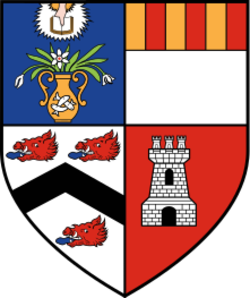Aberdeen University
(University) | |
|---|---|
 | |
| Motto | Initium sapientiae timor domini (Latin) |
| Type | PublicAncient university |
The University of Aberdeen is a public research university in Aberdeen, Scotland. It is an ancient university founded in 1495 when William Elphinstone, Bishop of Aberdeen and Chancellor of Scotland, petitioned Pope Alexander VI on behalf of James IV, King of Scots to establish King's College,[1] making it Scotland's third-oldest university and the fifth-oldest in the English-speaking world. Aberdeen is consistently ranked among the top 200 universities in the world and is ranked within the top 20 universities in the United Kingdom according to the Guardian.
The university comprises three colleges - King's College, Marischal College, and Christ's College - that are now mainly ceremonial. The university as it is currently constituted was formed in 1860 by a merger between King's College and Marischal College, a second university founded in 1593 as a Protestant alternative to the former. The university's iconic buildings act as symbols of wider Aberdeen, particularly Marischal College in the city centre and the crown steeple of King's College in Old Aberdeen. There are two campuses; the predominantly utilised King's College campus dominates the section of the city known as Old Aberdeen, which is approximately two miles north of the city centre. Although the original site of the university's foundation, most academic buildings apart from the King's College Chapel and Quadrangle were constructed in the 20th century during a period of significant expansion. The university's Foresterhill campus is next to Aberdeen Royal Infirmary and houses the School of Medicine and Dentistry as well as the School of Medical Sciences. Together these buildings form one of Europe's largest health campuses.[2] The annual income of the institution for 2017–18 was £219.5 million of which £56.1 million was from research grants and contracts, with an expenditure of £226.8 million.
Aberdeen has Template:HESA student population students from undergraduate to doctoral level, including many international students. An abundant range of disciplines are taught at the university, with 650 undergraduate degree programmes offered in the 2012–13 academic year. Aberdeen has educated a wide range of notable alumni, and the university played key roles in the Scottish Reformation, Scottish Enlightenment, and the Scottish Renaissance. Five Nobel laureates have since been associated with the university: two in Chemistry, one in Physiology or Medicine, one in Physics, and one in Peace.[3]
Contents
- 1 Academics
- 1.1 Anthropology
- 1.2 Biology
- 1.3 Chemistry
- 1.4 Classics
- 1.5 Divinity
- 1.6 Economics
- 1.7 Engineering and Physical Sciences
- 1.8 English, Literature, and Poetry
- 1.9 Geology
- 1.10 History and History of Art
- 1.11 International Relations and Politics
- 1.12 Law
- 1.13 Mathematics and Astronomy
- 1.14 Medicine and Physiology
- 1.15 Philosophy and Logic
- 1.16 Physics
- 1.17 Psychology
- 1.18 Zoology
- 2 References
- 3 Alumni on Wikispooks
- 4 References
Academics
Anthropology
Biology
Chemistry
Classics
- William Mitchell Ramsay
- Alexander Souter
- Peter Noble
- Jane Stevenson
- William Geddes
- John Stuart Blackie
- Barbara Craig
- D. E. L. Haynes
Divinity
Economics
Engineering and Physical Sciences
- William MacGillivray
- James Nicol
- James Cossar Ewart
- Henry Alleyne Nicholson
- Arthur Thomson
- James Ritchie
- Lancelot Thomas Hogben
- Alister Clavering Hardy
- V. C. Wynne-Edwards
- George Dunnet
- Paul Racey
English, Literature, and Poetry
- H. J. C. Grierson
- Andrew Rutherford
- George Rousseau
- Momus (musician), Nick Currie (Musician and writer)
Geology
History and History of Art
- Hector Boece
- Thomas Weber
- Paul Dukes
- Alastair J Macdonald
- Robert I Frost
- Stefan Brink
- Karin Friedrich
- David Dumville
- Roy Bridges
- Theo Barker
- J B Black
- Steve Boardman
International Relations and Politics
Law
Mathematics and Astronomy
Medicine and Physiology
- David White Finlay
- Professor Stanley Davidson
- Alexander Stuart Douglas
- William Stirling
- John Alexander MacWilliam
- John Macleod
- Alexander Ogston
- John Marnoch
- James Learmonth
- George Smith
- Dugald Baird
- Alexander Stuart Douglas
- Enitan Carrol
Philosophy and Logic
- Christopher Fynsk
- Hector Boece
- James Beattie
- John Lee
- William Ritchie Sorley
- James Black Baillie
- John Laird
- Donald M. MacKinnon
- L. Gordon Graham
- Catherine Wilson
- Robert Adamson
Physics
- James Clerk Maxwell (1856-1860)
- John Mallard
- William A. Edelstein
- George Paget Thomson (1922-1930), Nobel Laureate, 1937[4]
- Reginald Victor Jones (1946-1981)[4]
Psychology
Zoology
References
- ↑ last= Bulloch|first= John Malcolm|title=A History of the University of Aberdeen: 1495-1895 |url=https://archive.org/details/historyofunivers00bulluoft |access-date=20 December 2012 |year=1895|publisher=Hodder and Stoughton |location= London|pages=18–19}}
- ↑ https://www.timeshighereducation.com/world-university-rankings/university-aberdeen/courses/medicine%7Ctitle=Medicine - University of Aberdeen|work=Times Higher Education (THE)|access-date=2018-07-12|language=en}}
- ↑ http://www.abdn.ac.uk/news/fast-facts.php |title=Fast Facts | publisher=University of Aberdeen |access-date=27 June 2014}}
- ↑ a b Professors of Physics at The University of Aberdeen, https://homepages.abdn.ac.uk/npmuseum/article/Profs/Timeline.html
Alumni on Wikispooks
| Person | Born | Died | Nationality | Summary | Description |
|---|---|---|---|---|---|
| Kezia Dugdale | 28 August 1981 | UK | Politician | ||
| David Petrie | 9 September 1879 | 7 August 1961 | UK | Spook Police officer | Wartime head of MI6 after just 5 years in the organisation. |